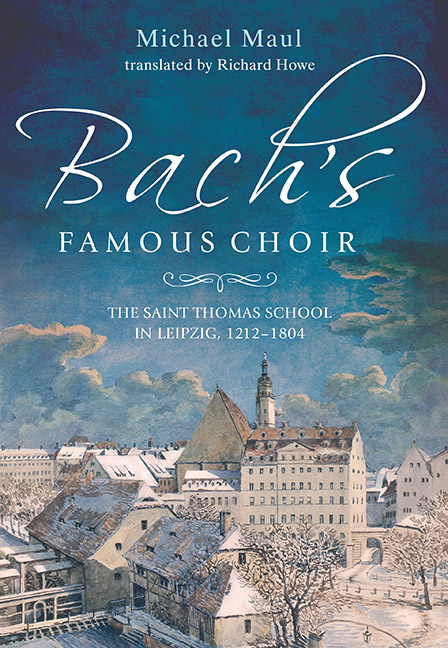Book contents
- Frontmatter
- Dedication
- Contents
- List of Plates
- Author's Note on the English Edition
- Translator's Note
- Preface
- Organization of the St. Thomas School in the 17th and 18th centuries
- Introduction
- I From Monastery to Municipal Music School, 1212–1593
- II How the St. Thomas School Became a Music School, 1594–1640
- III ‘Famous Throughout the Whole World of Music’, 1640–1701
- IV ‘Odd Authorities with Little Interest in Music’: the St. Thomas School in Crisis, 1701–1730
- V School for Scholars or ‘Conservatory of Music’? An ongoing conflict, 1730–1804
- Appendices
- Endnotes
- Bibliography
- Index of Persons
III - ‘Famous Throughout the Whole World of Music’, 1640–1701
Published online by Cambridge University Press: 04 April 2019
- Frontmatter
- Dedication
- Contents
- List of Plates
- Author's Note on the English Edition
- Translator's Note
- Preface
- Organization of the St. Thomas School in the 17th and 18th centuries
- Introduction
- I From Monastery to Municipal Music School, 1212–1593
- II How the St. Thomas School Became a Music School, 1594–1640
- III ‘Famous Throughout the Whole World of Music’, 1640–1701
- IV ‘Odd Authorities with Little Interest in Music’: the St. Thomas School in Crisis, 1701–1730
- V School for Scholars or ‘Conservatory of Music’? An ongoing conflict, 1730–1804
- Appendices
- Endnotes
- Bibliography
- Index of Persons
Summary
Boarding school statistics and personnel after 1634
The second half of the seventeenth century was the period in which the St. Thomas School most resolutely pursued its mission to be a ‘music school’ as set forth in the school regulations of 1634, and as a result came to be a byword for excellence as a top-notch producer of trained musicians. In these years the number of Thomaners who went on to become professional musicians was legion. The most prominent graduates were the later St. Thomas School cantor Johann Schelle (enrolled at the school in 1665); the ‘inventor’ of German opera, Reinhard Keiser (enrolled 1685; appointed prefect of the First Cantorey 1692; plate 22); the Darmstadt court capellmeister Christoph Graupner (enrolled 1695), the Dresden court capellmeister Johann David Heinichen (enrolled 1696), and the Merseburg court capellmeister Johann Theodor Romhildt (enrolled 1697). At no other time did the St. Thomas School produce so many first-rate musicians.
With the school's growing fame, the attractiveness of a place at the boarding school also increased. Almost every week musically trained boys from Saxony, but also from Thuringia and even more distant locales, arrived at the school to audition in the hope of getting on the waiting list that offered such promising career prospects. Countless entries in Rector Thomasius's journal attest to this lively coming and going in the late 1670s and early 1680s. The boys who were admitted were on average fourteen years old (so their voices had not yet changed – the average age for the onset of puberty in the seventeenth century may have been as late as sixteen or even seventeen) and were pledged to an average stay of five to six years (with the option to stay longer, plate 21).
But above all it is the St. Thomas School matriculation book, which has survived complete and intact from 1640 onward, that shows that the town council did not (at first) resume the practice of requiring the school's leadership to admit great numbers of impoverished Leipzig boys, who were proverbially unmusical (p. 98). Despite the hardships of the Thirty Years War, the documented share of the town's children at the boarding school in the years 1640–1657 of Tobias Michael's cantorate (1631–1657) was about 9.6 percent (18 out 187 boys altogether).
- Type
- Chapter
- Information
- Bach's Famous ChoirThe Saint Thomas School in Leipzig, 1212–1804, pp. 73 - 140Publisher: Boydell & BrewerPrint publication year: 2018

